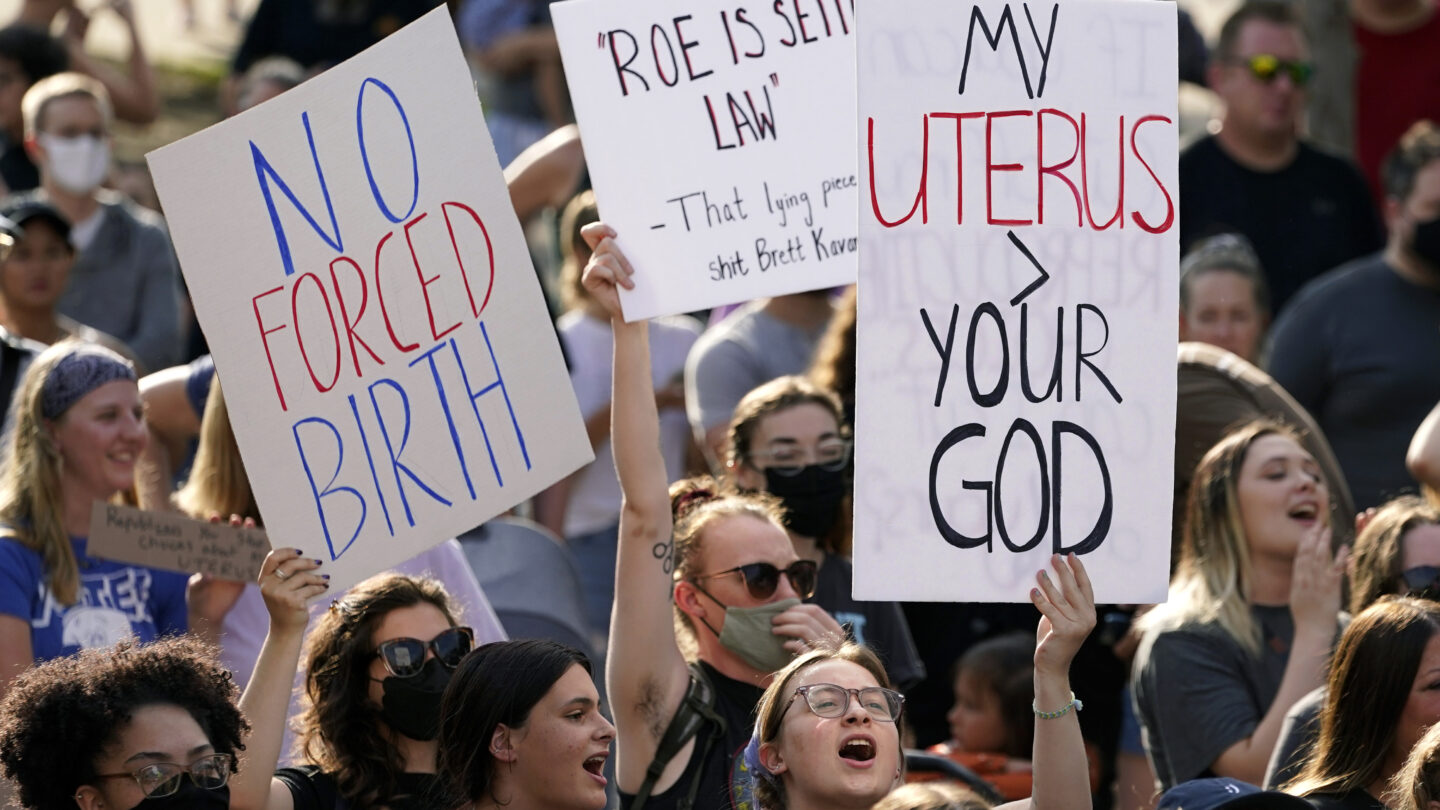All but seven state legislatures are now in session, and abortion-related bills continue to be introduced, especially in states where the procedure is already banned. It can be hard to monitor them all, so States Newsroom’s Reproductive Rights Today team will track certain bills that could become law in their respective states in a biweekly legislative roundup.
Depending on the partisan makeup of a state’s legislature and other state government officials, some bills have a higher chance of passing and becoming law than others.
Iowa
Abortion is legal in Iowa after a court blocked a six-week abortion ban from going into effect in July 2023. A bill allowing material produced by an anti-abortion group to be used in Iowa’s public school curriculum has not advanced since late January, but another abortion-related bill has cropped up since then.
House Study Bill 621: Iowa Capital Dispatch reports this bill would make the termination of a pregnancy without consent from the pregnant person a more significant felony if it were caused during the act of a “forcible felony,” such as murder, assault or sexual abuse. Language in the statute would also be amended to say the crime is from the termination of a human pregnancy to the “death of an unborn person.” Some who testified in favor of the bill argued it wasn’t about abortion, but organizations that testified against it all spoke to unintended consequences of such a change, including opening the door to further legislative penalties and potentially restricting access to contraception and other reproductive care.
Status: Passed House Judiciary Committee, eligible for consideration by the full House of Representatives
Sponsor: House Judiciary subcommittee
House File 2031: According to the bill, a video showing the development of a fetus would be required to be shown in health classes in Iowa schools, Iowa Capital Dispatch reported earlier this month. Teachers would have to show students a video displaying an ultrasound and fetal development, and the bill called out the “Meet Baby Olivia” video as an example. That video is produced by Live Action, an anti-abortion organization.
Status: Passed by the Education Committee, eligible for consideration by the full House
Sponsor: Republican Rep. Luana Stoltenberg
Kansas
Republican legislators in Kansas continue to introduce bills related to abortion, despite Kansas voters’ overwhelming rejection of abortion bans in a referendum shortly after the Dobbs decision in 2022. Abortion is legal in Kansas, and six clinics provide in-clinic services. Senate Bill 354 and House Bill 2515, which excluded facilities performing abortion from the state’s health care stabilization fund and created a civil cause of action against abortion providers, respectively, have not received hearings. But other bills have been introduced.
House Bill 2749: Kansas Reflector reports this bill would require abortion providers to ask patients why they are terminating their pregnancies, including a ranking of “top reasons” for seeking an abortion such as financial struggles, health problems as a result of pregnancy, or that the pregnancy is a result of rape or incest, as well as several pieces of demographic information. The bill was requested by Kansans for Life, the main group that pushed the 2022 referendum to allow abortion bans. It would also apply to minors.
Status: Passed by Health and Human Services Committee
Sponsor: Requested on behalf of Kansans for Life by Republican Rep. Ron Bryce
Maine
Democratic legislators in Maine outnumbered Republicans by one in committee to recommend a proposal to enshrine abortion rights in the state constitution earlier this month. Legislative Document 780 would have to be passed by two-thirds of the legislature, and then voters would decide whether to approve it in the November general election, Maine Morning Star reports. The House of Representatives is made up of 80 Democrats and 68 Republicans, and the Senate is split with 22 Democrats and 13 Republicans, so the resolution will need Republican support to pass.
Status: Awaiting vote from the full House
Sponsor: The resolution is sponsored by nine Democrats and one Independent
Missouri
Nearly all abortions are banned in Missouri, but lawmakers have continued to try to deny Planned Parenthood from receiving reimbursements under the state’s Medicaid program. Missouri Independent reported last week that for the second time in four years, the state’s supreme court ruled that efforts to defund Planned Parenthood through the state budgeting process are unconstitutional. However, lawmakers have continued to advance legislation that would achieve the goal instead.
Senate Bill 1168: Prohibits the spending of any public funds to an abortion facility or its affiliates or associates, including Medicaid through the MO HealthNet program. Without naming Planned Parenthood directly, the bill mentions any provider “founded by a person who supported eugenics,” an oft-repeated anti-abortion talking point about Planned Parenthood founder Margaret Sanger.
During debate on the bill on Feb. 7, Democratic Sen. Tracy McCreery attempted to add two amendments adding rape and incest as exceptions to the state’s abortion ban, which currently only includes an exception to save the pregnant person’s life. Republicans defeated the amendments on party lines after the debate. Sen. Sandy Crawford said while rape would be “mentally taxing” for anyone, it doesn’t justify an abortion because “God does not make mistakes. And for some reason he allows that to happen.”
Status: Awaiting a vote by the full Senate
Sponsor: Republican Sen. Mary Elizabeth Coleman
Oklahoma
Oklahoma has a near-total abortion ban, and lawmakers pre-filed bills before the session started Feb. 5. Some have advanced, while others are still awaiting a hearing, including Senate Bill 1729 and Senate Bill 1778, which we detailed in the previous update.
House Bill 3216: Oklahoma Voice reports this bill, crafted with the conservative religious group Alliance Defending Freedom, creates a civil mechanism for those who help someone obtain an abortion, and it creates requirements for physicians to report each abortion performed in the state, including a “unique patient identifier” registered with the state’s health department. When concerns were raised that those identifiers could create a tracking system of sorts, the sponsor said he is willing to amend it, so that isn’t possible. Republicans and Democrats on the committee are also concerned the bill could ban some forms of birth control, such as IUDs.
Status: Approved by committee on Feb. 15, awaiting consideration by the full House
Sponsor: Republican Rep. Kevin West
House Bill 3013: The act of “trafficking” abortion pills would become a felony, punishable by a $100,000 fine, 10 years in prison or both. It does not apply to pharmacists or manufacturers lawfully distributing abortion-inducing medication.
Status: Approved by committee on Feb. 15, awaiting consideration by the full House
Sponsor: Republican Reps. Jim Olsen and John Talley
South Dakota
While activists continue to gather signatures for a ballot initiative to add abortion rights to the state constitution, the South Dakota Legislature has approved House Concurrent Resolution 6008, stating their opposition to the ballot measure and arguing it would make women, children and health care providers less safe if it passes. The House and Senate approved the resolution by wide margins last week after passing it in committee earlier this month, according to South Dakota Searchlight.
House Bill 1224: The Searchlight also reports this bill mandates the state’s health department to create an informational video describing the state’s abortion law, including what actions do and do not qualify as an abortion, the most common medical conditions that can threaten a pregnant person’s life, and standards of care around treatment of pregnant people, among other provisions.
Status: Passed the House of Representatives, awaiting hearing in Senate committee
Sponsor: Republican Rep. Taylor Rehfeldt, 27 other Republicans and one Democrat
Tennessee
House Bill 1729, which was featured in the last update, was withdrawn by the sponsor after a similar bill, HB 1884, failed to advance in the subcommittee. The bill would have specified that criminal abortion does not include an abortion performed during a medical emergency affecting the physical or mental health of the pregnant person or performed on a patient whose pregnancy was the result of rape or incest.
House Bill 1895: This bill is similar to Idaho’s law but doesn’t hew as closely to the same text as Oklahoma’s proposal. It also includes the act of obtaining abortion pills for a minor, regardless of where the pills were obtained. It does not pertain to parents or legal guardians, but any other violators are subject to a Class C felony, which is punishable by three to 15 years in prison and up to $10,000 in fines. It also includes a civil cause of action.
Status: Scheduled for hearing by Health Committee on Feb. 21
Sponsor: Republican Rep. Jason Zachary and Republican Sen. Paul Rose
Story provided by WABE content partner Georgia Recorder









